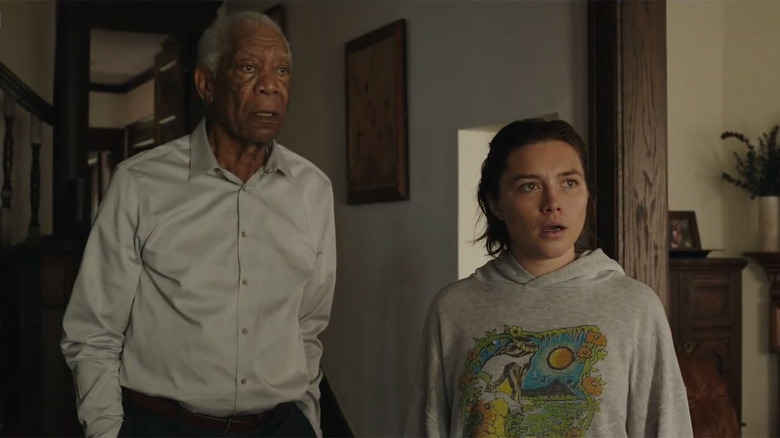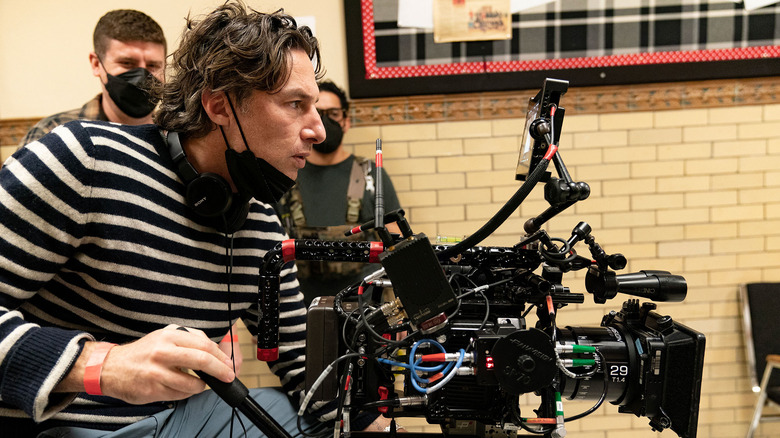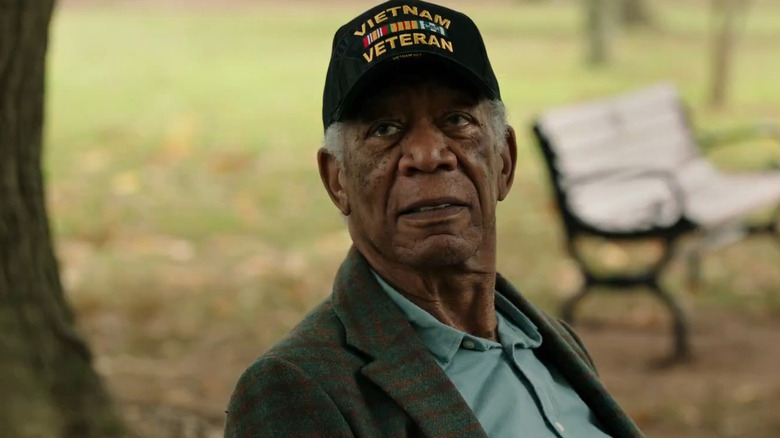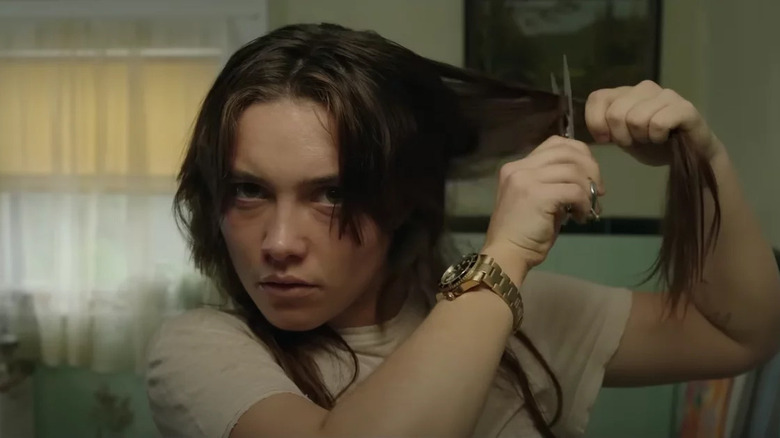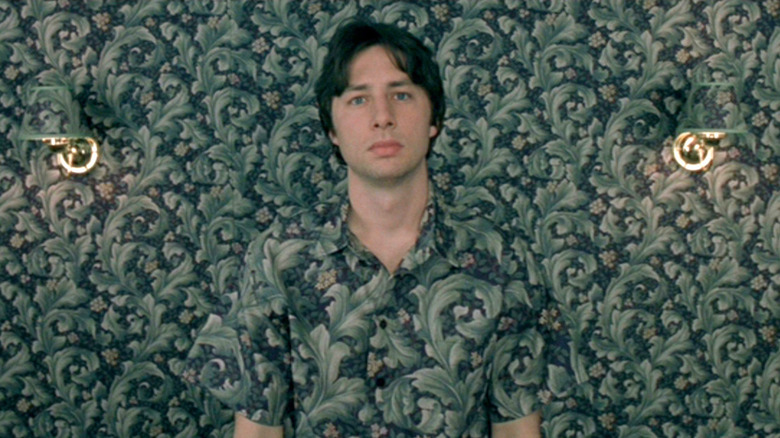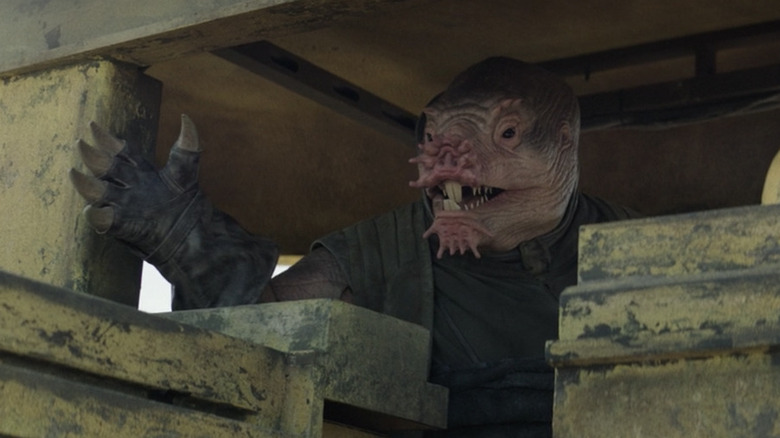How Zach Braff Grew From Garden State And Wanted To Emulate James L. Brooks For A Good Person [Exclusive Interview]
Nearly 20 years ago, "Scrubs" star Zach Braff made quite the splash as a filmmaker with his feature directorial debut "Garden State." A perfect example of an indie darling, the film announced Braff to the world as an exciting new talent behind the camera. However, since then, he's only directed two more feature films. There was the crowdfunded "Wish I Was Here," which arrived 10 years after "Garden State" to middling reviews, and the studio heist comedy "Going in Style," which starred Morgan Freeman, Michael Caine, and Alan Arkin, and it took Braff outside of his indie comfort zone. Of course, in that time Braff has also directed episodes of acclaimed TV shows like "Ted Lasso" and "Shrinking," and he's learned a lot over the years.
That brings us to "A Good Person," Braff's fourth feature film (watch the trailer here). As a writer and director, Braff heads back to New Jersey with a story that feels like a matured, spiritual successor to "Garden State" in a lot of ways. Not only does it show his growth as a filmmaker, but it give us the kind of adult dramas that studios don't really like to make anymore. In fact, this movie is basically an independent production. Leading up to the limited release of "A Good Person" this weekend, I was happy to speak with Braff about his latest effort as a filmmaker. We talk about the fine line between raw drama and melodrama, still being nervous about directing Morgan Freeman, and whether or not he's pinpointed his own directorial style. Plus, we couldn't help but look back at "Garden State" and talk about the time that Braff spent in the "Star Wars" universe on the "Obi-Wan Kenobi" series on Disney+.
This interview has been lightly edited for clarity.
'I felt like if I had the foundation of South Orange, New Jersey, my hometown, I wouldn't screw that up'
Zach Braff: How are you, man? I love /Film.
Oh, thank you! I appreciate that. I always like to hear that. I wanted to start off by asking — this feels like a spiritual successor to "Garden State" in a lot of ways. There's not a prominent romantic focal point, but you return to New Jersey. It's about grief after death. And you have a character who needs to stop taking drugs. But this time it's because the drugs will probably end up killing them. Whereas in "Garden State," your character needed to stop taking drugs in order to truly live their life.
Yeah.
Was this a therapeutic film for you because of that, a way of tapping into your own growth as a filmmaker and as a person?
Well, that is really beautifully said and great insight that I probably didn't even notice. I'm drawn to writing about Jersey because I feel like I could get it right, especially if I'm going to write something that's vulnerable, like both movies are. I'm really opening up my heart and saying, "This is what I feel, this is what I've experienced." In this case, it was a lot of grief in the last four years of my life, losing people that were important to me. I felt like if I had the foundation of South Orange, New Jersey, my hometown, I wouldn't screw that up. At least the foundation would be authentic and real and true, because I know what that world is. And I bet I felt that as a 25-year-old when I made "Garden State." There's a bit of a security blanket to it, writing what you know.
And yeah, I think what it really is, is that it's hard for me to write. I find it very, very challenging to write. So I don't do it until I've sort of reached the point where I need to get this out, I have something to say that I hope will be relatable to people. So during the pandemic, during lockdown, this is the story that kind of came out of me.
This is a story that I think could easily feel like a melodramatic after-school special. But because of the performances and your ability to write such genuine dialogue, it never feels like that. It reminds me of James L. Brooks, but with a contemporary touch.
Oh, well, listen, saying it reminds you [of] James L. Brooks is the highest compliment to me. I love those movies. I love him. And yeah, that's what I was trying to do. My father took me to "Terms of Endearment" way too young. My mom screamed at him, "Why the hell did you take him to 'Terms of Endearment?'" Because I was sobbing after. But I also remember laughing a lot. I think it was Tarantino who said, "Write the movies you want to see." And that's how I felt. I wanted to write a movie that's the kind of movie I want to see, that I want to go to. So yeah, I aspired to write a story that was a mix of emotion and good dialogue with humor.
'I think with music and score, you need to really be restrained'
How do you walk that thin line between real drama and melodrama? Because it's very difficult to do something with this kind of subject matter without veering into that melodramatic territory. As a writer and director, how do you do that?
I think, for me, I have to use restraint, because I think it's very easy to go too far. It's tricky when you have these incredible actors that are breaking your heart. But it's real, and there's a very thin line between raw and real and then melodrama. For me, I constantly, I need advice from other creative people. My editor, Dan Schalk, he's an editor I've never worked with before, and he really helped me be restrained. There are other filmmakers that I look up to, who I showed the film to, and they gave me good advice on where I might be pushing and being restrained.
I think with music and score, you need to really be restrained. There are some really impactful scenes in this movie that happened, just totally a blank slate and no score at all. Whereas I think a younger me would've pushed score on it, just because it just felt right. But I do think that's a part of restraint, letting the actor and the dialogue just sit without having the score comment on it. All of that stuff I'm learning. I'm continuing to learn as a filmmaker and hopefully getting better. And that's all stuff I'm learning as I go.
For sure. You mentioned these great performances, and this is your second time working with Morgan Freeman. But I read that you were still afraid to ask him to take this role in this movie. What made you change your mind, and do you find that you still have to hype yourself up in order to give him direction?
Oh, dude, absolutely. Every single morning in the mirror, I was giving myself pep talks. And we're friendly with each other. I've directed him twice now. He's just very intimidating. I mean, he's Morgan Freeman. So I definitely had to be talking to myself in the mirror, like, "You've got this, don't be a wimp."
I just directed Harrison Ford too [in "Shrinking"], and what I find with these great legends is, it doesn't matter if they're them or they're someone fresh out of acting school. Everybody wants a leader. They want someone with a plan and a vision and to take control of the reins. When they see that there's not, and they see that you don't know what you're doing, that's when they get pissed off and things go rogue.
So with Morgan, the good thing is he had seen me direct a much bigger movie, a heist comedy in Manhattan. It was big, and it was a huge crew, and it was a lot. So when it came down to a small movie shot in 26 days, I just didn't think he'd say yes. He doesn't do a lot of indie movies. He certainly doesn't attach himself to movies that don't have financing, and that was our case. But my father always said to try, so I thought, you know what, I'm just going to try because what do I have to lose? What's the worst thing that happen? He says, "No." And I sent it to him, and I thought, "Oh gosh, I'm going to have to wait two weeks to even hear if he's going to read it." And he called me the next day and he didn't even say hello. I just picked up the phone and he said, "I see myself on every page of this script." And I was like, "Does that mean yes?" And he's like, "Yes, that means yes."
That's great.
And then I had this wonderful image in my mind, which was the New Jersey diner scene of Florence Pugh, opposite Morgan Freeman, the most exciting ingenue opposite this great, grand Obi-Wan master. And I just thought, "Wow, I want to see that movie. I want to see those two interact."
'So that was really special, because those are completely written by Florence'
Speaking of Florence Pugh, she sings some original songs in this movie. Did you work with her on developing those songs, such as writing the lyrics, or was that something that you left to her as an actress?
They're all her's. I had nothing to do with the songs other than say, "Alison writes a song here." I know that Florence is a singer and a songwriter, and I knew that she often would use music as a way of journaling to sort of get her emotions out when she was going through something. So I wrote that into the character. I thought, "What a cool thing to be able to use." And then I asked Florence if she would write original songs for the movie, and if we could use them for the character. So that was really special because those are completely written by Florence.
I love that. I read in an interview, and this was roughly 10 years ago, where you said all of your favorite filmmakers have a style where you can instantly tell it's their film. And you absolutely wanted to have your own style, but at the time, this was just your second movie. I wanted to know if you have figured this out now: what would you say are the style points of a Zach Braff movie?
That's a great question. You ask good questions. Thank you.
Oh, thanks!
Well, I would say I aspire to do that. "Going in Style," I would say, is probably outside of my style because it was meant to be in the comic heist genre. I think areas of that are my tone, but that was a bit of an outlier because it was a studio movie. I think, with my indie films, they're about love, ultimately. Either romantic or familial. They're about how love and friendship save us. They're about changing a chapter. I think there's usually good music. And I think I have a style that I've developed with cinematography. I've worked with two, on my indies, two legendary filmmakers, [Lawrence] Sher and Mauro Fiore. I think, with both men, I've developed a really cool aesthetic. Really loving. "Garden State" was Super 35, but my other three have been anamorphic. So I don't know, I hope that there are elements that people see are similar in tone.
'But I won't listen to the Garden State tracks...'
Next year marks the 20th anniversary of "Garden State." It's crazy to think about that. I have to tell you, this is a film that kind of changed my life. "Garden State" and "Eternal Sunshine of the Spotless Mind" came out the year I was graduating high school and heading into college. Both movies totally floored me and pushed me into absorbing all kinds of indie cinema. It really drove my love for movies.
Wow. That's awesome.
Yeah, and I wanted to ask you, how do you look back upon "Garden State" now after all these years? What kind of place does it occupy in your mind?
Well, it's funny, I got a little trivia for you. We took over the "Eternal Sunshine of the Spotless Mind" production office once they wrapped. So the two movies that influenced you shared the same production office.
Oh, that's so cool.
And I love ["Eternal Sunshine"] too. I honestly didn't think anyone was going to see the movie, man. Nobody wanted to finance it. Nobody wanted to make it. We made it for no money in 25 days. And just the juggernaut, The Little Engine That Could, that movie has been. It continues to be a movie that a young generation is finding. HBO is showing it all of a sudden again. It's amazing to me that it keeps having a life around the world. People send me the foreign movie posters from countries, and I've collected them over the years. The soundtrack, I bet the soundtrack comes up almost every day in my life, someone says something to me about it. So it's amazing. I was 26 years old, man. I certainly didn't think anyone was going to see it. And I just feel so lucky that it had the impact on people that it did.
Speaking of the soundtrack, it really is a bastion of indie rock from the 2000s. Do you find yourself able to still listen to the songs that were on the soundtrack, or is it hard?
No. [laughs] No. It's funny, when they come on, I'll listen to The Shins, because I continue to love The Shins. But I won't listen to the "Garden State" tracks, because, I don't know, it's just such a sensitive place in my heart. It's such a little lightning in a box — what's the expression? — lightning in a bottle moment. I don't know, it's kind of like I don't want to touch it. I'm too sensitive around the time and the experience. So I can't listen to Coldplay's "Don't Panic" or [those] particular Shin songs. But I do love the music. And I'll still listen to Coldplay and The Shins, but just not those songs.
Yeah, that makes sense.
'It took about four puppeteers to move the face and one to wear it'
One final thing, because I wanted to get a little nerdy with you. You had a role in the "Obi-Wan Kenobi" series, which must have been incredibly cool. How did that come about? And was there a moment that happened while you were making it that totally floored you, that you still can't believe actually happened to you?
Well, all of it, dude. I'm a movie geek like you, and I just love that stuff. Deborah Chow, before she became the mega director that she is now, in her very first independent movie "The High Cost of Living," I was the star. We made it for a million bucks in Montreal, and it was a really good movie. Very, very heavy subject matter. But she made a really powerful film. I could tell right away that she was going to be a success. And we've stayed in touch. I've watched her as she was ascending in her TV career.
When she got all of "Obi-Wan," I was like, "Oh my God, congratulations. This is so insane. I'm so proud of you. This is huge. I remember you when." And she said, "There's not really a character for you in the series, but would you ever do a creature? There's something cool about the 'Star Wars' canon, if you're a creature and you're just a voice, you're not prevented from being other real human characters."
And I was like, "I don't care." She's like, "No, a lot of people care. They won't do a character voice because they don't want to be prohibited from one day seeing their faces in the world of the show." So I got to go to set, and the Freck costume is just this amazing puppet. It took about four puppeteers to move the face and one to wear it. Then the jaw, the mouth was controlled by a rig that I would wear on my face. So when I'm talking, they had a mic on me so you and the little girl [playing Leia] could hear me. But they're acting and interacting with Freck, and he's talking and moving and moving to my jaw. It was so trippy and so cool.
I guess my favorite part was, there was one point where the little girl, she was having trouble with the eye line. It was one of those things in movies where we need you to look at a piece of tape and act to a piece of tape, which happens, and she was having trouble with that, understandably. And Deborah goes, "Zach, would you mind just taking the gear off your head? Would you mind just climbing up into that Freck vehicle and getting close to the camera and being her eye line as Freck for her and Ewan?" And that was really cool because I love Ewan [McGregor] so much. I got to be not just a mysterious voice on set, but climb up and act with Ewan, which was cool.
"A Good Person" begins playing in limited theaters starting on March 24, 2023. It will get a wider release on March 31.
